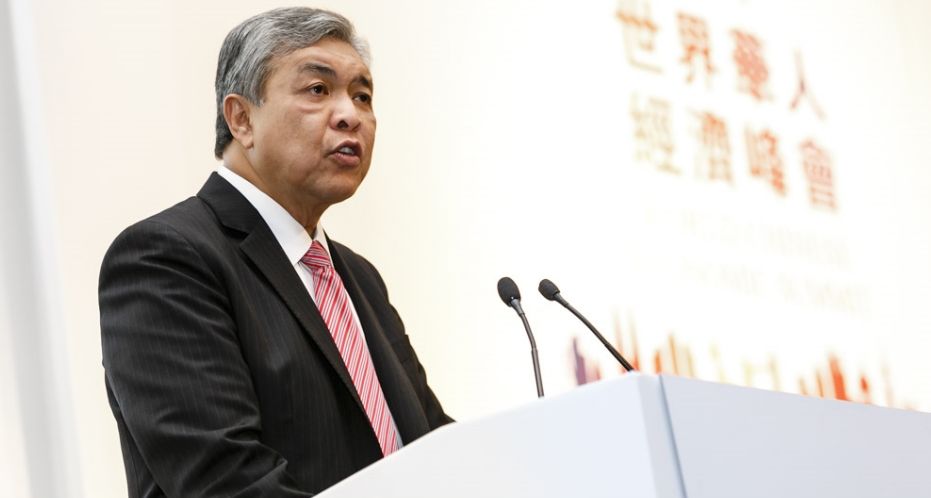Driving commercial and political engagement between Asia, the Middle East and Europe
Driving commercial and political engagement between Asia, the Middle East and Europe
Driving commercial and political engagement between Asia, the Middle East and Europe

ASEAN must adopt a consultative not isolationist approach to China to ensure that its Southeast Asian neighbours benefit from the country’s rapid economic growth, Malaysia’s Deputy Prime Minister told the 7th World Chinese Economic Summit.
“We are not competitors here, rather teammates,” Dr Ahmad Zahid Hamidi said in a keynote address at the conference, co-organised by Asia House and Malaysia’s Asian Strategy and Leadership Institute (ASLI).
“China is no longer a sleeping dragon, but rather an awakened lion. And when she roars, the whole world will listen,” he said.
“With China now ranked the world’s largest economy on purchasing power parity according to the International Monetary Fund (IMF), it is integral that we work together as a global community to foster and integrate this growth in a way that we all become beneficiaries.”
He told delegates at London’s The Savoy Hotel that the slowdown in growth and the “wider transition of the Chinese economy” was to be expected after average growth in the country had sat at around 10 per cent for the last 30 years and this was not a cause for panic.
China’s meteoric economic advance in the past 30 years has lifted more than one billion Chinese out of extreme poverty (almost 10 per cent of the world’s total population) and helped insulate China from the 2008 global financial crisis, he said.
“China’s use of expansionary fiscal policy in supplementing for the lack of export demand through a four trillion yuan stimulus package saw off another Great Depression, and even saved some economies that were reliant on commodity exports, such as Australia, from experiencing an extended recession,” he said.
“This is why it is so important for us to take a consultative and integrative, rather than isolationist approach to China,” Dr Hamidi told delegates.
He said ASEAN had benefited from booming bilateral trade with China, pointing out that in the decade between 2003 and 2013, trade grew fivefold from US$78 billion to US$444 billion.
“With China remaining ASEAN’s largest trading partner, this figure grew by 8.23 per cent last year to reach US$480 billion,” he said.
Click below to see a slideshow of the World Chinese Economic Summit
Negotiations were underway to agree a free trade agreement between the 10 ASEAN member states and the six countries that ASEAN has existing free trade deals with, which includes China. The Regional Comprehensive Economic Partnership once completed will encompass some three billion people and 40 per cent of world trade.
“Through China’s efforts to bolster domestic demand, as well as rapid urbanisation and the millions that this is bringing into the middle class, demand will grow for products and services from the ASEAN states,” Hamidi said.
At the same time, the 600 million-strong consumer market in ASEAN was attractive to Chinese businesses.
”We see China as an important partner for ASEAN, and welcome China’s Belt and Road initiative, as well as the establishment of the Asian Infrastructure and Investment Bank (AIIB) – both of which we have joined,” Dr Hamidi said.
“Strengthening ASEAN-China ties is key to regional peace and prosperity in Southeast Asia,” he added. “I hope the problems in the South China Sea will not disturb the relationship between China and ASEAN.”
He cautioned that more confidence building measures and conflict resolution strategies were needed to avoid any conflict in the South China Sea, where disputes over China’s claim to sovereignty over potentially resource-rich territories have increased tensions.
He said the rise of Asia today represented a return to the 16th century when the continent accounted for the majority of the world’s population and contributed to nearly 50 per cent of world trade. The Belt and Road initiative represents China’s return to the epicentre of global trade and activity, he said.
“This transition will require a fundamental rethink of current policies and practices. We can no longer act in unilateral self-interest, or maintain a Cold War – us against them – mindset during our international engagements,” he said.
“Collaboration is key if conflict is to be avoided,” he concluded.
David Cowell is a freelance business journalist.
To read the other stories from the World Chinese Economic Summit click here.
